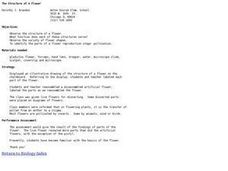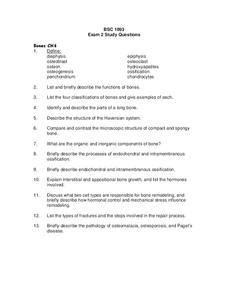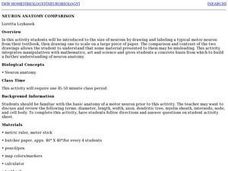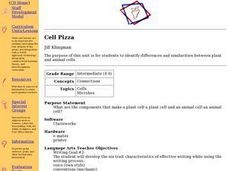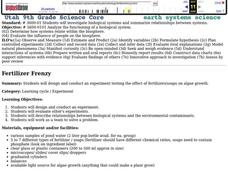Curated OER
Investigation Xylem
Students investigate how water travels up the stem of vascular plants by using food coloring to stain the xylem of a number of different plants. They know the function of leaves, stems, and root at the end of the experiment.
Curated OER
Plasmolysis in Elodea Plant Cells
Students microscopically observe various subcellular components. They determine the effects of different salt solutions on Elodea plant cells. Students explain the major function of a cell membrane and describe its structure.
Curated OER
The Structure of A Flower
Learners study the structure of flowers. In this biology lesson plan, students observe the structure of a flower and find out what function each of the structures serve.
Curated OER
The Internal Anatomy of the Grasshopper
Sixth graders explore the internal organs of grasshoppers. They determine the function of the organs through a dissection activity.
Curated OER
Pond 2: Life in a Drop of Pond Water
Students observe organisms found in pond water with a microscope. In groups, they discuss how single-celled organisms satisfy their needs for food, water and air. They compare and contrast the needs of macroscopic and microscopic...
Curated OER
Tree Friends
Young scholars are introduced to tree structure and use. They identify their special tree using all senses except sight. Students identify six different internal parts within a cross section of tree trunk (bark, phloem, xylem, cambium,...
Curated OER
Bones
In this bones worksheet, young scholars list and describe the functions of bones and give examples for each. Then they compare and contrast the microscopic structure of compact and spongy bone. Students also list the types of fractures...
Curated OER
Neuron Anatomy Comparison
Pupils create a scale model of a motor neuron that is two hundred times larger than the actual neuron. They identify the structures of a neuron and observe neurons under the microscope then use a worksheet to convert actual sizes into...
Curated OER
An Introduction to 'Opae 'ula
Students examine the 'opae 'ula. In this science lesson, students observe a live specimen and identify the major body parts. Students construct habitat jars and observe the 'opae 'ula behaviors.
Curated OER
Transportation in Plants
Learners investigate how plants transport water and nutrients through the plant. In this transportation in plants lesson plan, students use glass tubing, celery stalks, food coloring and leaves from plants to observe adhesion and...
Curated OER
Cell Pizza
Students identify parts and functions of microscope. Students watch video, Cells and Life about cell parts with actual pictures and actual cells. Students discuss video and identify parts of the cells that animals and plants have in...
Curated OER
Seeing Cells
Sixth graders study living cells and their functioning units. In this cell lesson students color cell diagrams, answer questions and discuss the differences between plant and animal cells.
Curated OER
Pollen Tube Growth
Students demonstrate the proper usage of the compound and dissecting microscopes. They identify the parts of a flower and the functions of the flower parts. Students describe the process of gamete formation and fertilization in a flower.
Curated OER
Cell Works
Students identify the different parts of the cells and their functions. In this biology lesson, students create an analogy of a cell and its organelles. They make a poster and present it to class.
Curated OER
What Does Your "Homunculus" Look Like?
Students determine the density of touch receptors in various parts of the body on the right hand side. They use collected data to draw a picture of the
"homunculus" of an experimental subject.
Curated OER
Your Kidneys
In this kidneys worksheet, students review the structure and function of the kidneys in the human body. This worksheet has 18 fill in the blank statements.
Curated OER
Build Your Own Cell
In this building your own cell worksheet, students identify cell vocabulary and facts, and create posters of a labeled plant cell and an animal cell. In this fill-n-the-blank and posters worksheet, students provide twenty-three answers.
Curated OER
Ecosystems and Remote Sensing
Students obtain remote sensing data to compare and contrast global biomass data with global temperature data.
Read Theory
Analogies 3 (Level 6)
Positive and negative may be opposites, but what does that have to do with the words clean and filthy? Ask your pupils to consider word relationships as they complete the 10 analogies presented here. Note that the exercise gradually...
Curated OER
Sensational Seaweed
Young scholars compare kelp and land plants. In this sea plant lesson, students look at the role of algae in aquatic environments. They research the properties of kelp and explore seaweed.
Teach Engineering
An Inflated Impression of Mars
Help your class understand the magnitude of the distance between Earth and Mars with an activity that asks small groups to use balloons to create scale models of the Earth, Moon, and Mars. Class members figure out the distances...
Nuffield Foundation
Dissection of the Ventilation System of a Locust
Jiminy cricket! If you find yourself plagued by fear of dissection, these locust respiratory system dissection directions will walk you through everything you need to know. Teens inspect a living locust to begin with, then jump over to...
Curated OER
Drugged Out Daphnia
Ninth graders participate in experiments to investigate the the effects of nicotine, caffeine, aspirin, alcohol, and sleeping pills on the heart rates of Daphina. They describe the relationships between common drugs and heart rates....
Curated OER
Fertilizer Frenzy
Ninth graders design and conduct an experiment. They evaluate other's experiments. Students describe relationships between biological systems and the environmental contaminants. They work as a team to solve a problem.




